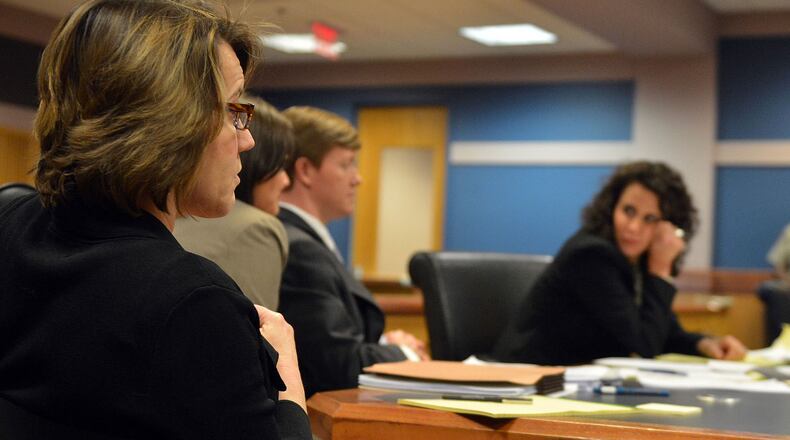The state ethics commission was “broke” and needed fixing, and that’s the only reason its former director had her salary cut, former commission Chairman Patrick Millsaps testified Tuesday.
Millsaps was the first witness called in the trial involving the commission and its investigation into Gov. Nathan Deal’s 2010 campaign. Former commission director Stacey Kalberman sued the agency, claiming she was forced from her job for investigating Deal’s campaign.
“I don’t remember the specifics, but we were looking at overhauling the whole thing,” Millsaps said. “It was broke. We were trying to fix it.”
Kalberman attorney Kim Worth asked Millsaps why the budget concerns he used as the rationale for cutting Kalberman’s salary never came up before the Deal investigation gained steam. Millsaps rejected the implication and said there was no conspiracy.
“It wasn’t just about the governor,” he said. “I wanted to know if we were going to be able to afford the minimum. You keep calling it ‘Deal, Deal Deal,’ and that was one investigation. The commission was not designed or tasked only to investigate the governor of the state.”
Kalberman’s suit has helped toss the ethics commission into turmoil. Depositions in the case have alleged, among other things, that the commission’s current director claimed that Deal owed her after his case was settled with the governor facing only a minor penalty. Holly LaBerge, the director, has denied the accusation.
The agency, which is charged with overseeing how public officials raise and spend campaign money, faces two other whistleblower lawsuits, plus at least two state inquiries into its performance and federal grand jury subpoenas.
Earlier Tuesday, Worth told jurors in her opening statement that Deal is not on trial, but she walked them through a series of connections that point toward the governor. From Deal’s private attorney Randy Evans to his official state lawyer, Worth said all were involved before and after Kalberman’s ouster.
“We may not know who the puppet master was,” Worth said. “What we know is that it happened. What we know is the reason it happened.”
Millsaps was chairman when Kalberman and her top deputy, Sherilyn Streicker, presented the commission draft subpoenas for records related to a series of complaints filed against Deal’s campaign. Shortly after, however, Millsaps told Kalberman the agency faced a financial crisis and said her salary would be cut 30 percent and Streicker’s job would be eliminated.
The idea that the personnel moves were related to the Deal investigation is false, Millsaps testified. “It was clear to me this was an attempt to successfully take the spotlight away from the budget issues and on to, oh, me and my buddy Governor Deal, whom I’d only met twice at that juncture,” he said.
Assistant Attorney General Bryan Webb, however, said the Deal investigation was not the reason commissioners moved to restructure the agency’s leadership. The budget crisis was real, he said, and salaries accounted for nearly 90 percent of the entire commission budget.
“This is not about the Deal investigation,” Webb said. “It’s not about a puppet master. It’s not about someone pulling the strings. It’s about what Ms. Kalberman said and what Ms. Kalberman does. She sits here because of her own actions and not because of the Deal campaign.”
Kalberman’s lawsuit centers on a few months in late spring 2011 after Kalberman and Streicker presented the draft subpoenas on May 3. The subpoenas went unsent, and on June 9, Kalberman was told that the commission faced a financial crisis, that her salary would be cut and Streicker’s job would be eliminated. In between, commissioners and a Deal aide were interviewing LaBerge as a possible replacement for Kalberman.
“The governor’s office does not recruit somebody to replace someone in a job that’s not posted unless there is an intention to shut down the Deal investigation,” Worth told the jury.
Kalberman eventually agreed to resign. LaBerge was hired, and in 2012, the commission dismissed the major complaints against Deal, who agreed to pay $3,350 in technical fees for errors in his campaign finance reports.
Millsaps, the former chairman, said under oath that if the governor’s office helped recruit LaBerge, “it doesn’t pass the smell test” when asked if it was inappropriate for the man being investigated to help pick the investigator.
Streicker, meanwhile, has filed her own whistleblower lawsuit against the commission, as has former commission computer specialist John Hair. Hair claims LaBerge ordered him to alter and destroy documents related to the Deal case, a charge LaBerge denies.
Late Tuesday, LaBerge took the stand. She repeated her earlier testimony in a deposition that she was contacted by someone in the governor’s office about the job. She said she did not believe it was Ryan Teague, Deal’s chief counsel, whom the governor’s office has identified as having called LaBerge.
About the Author


